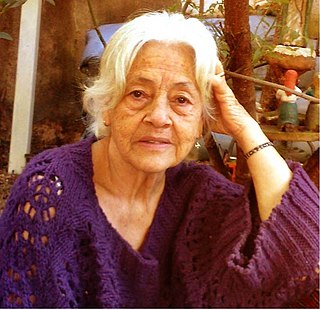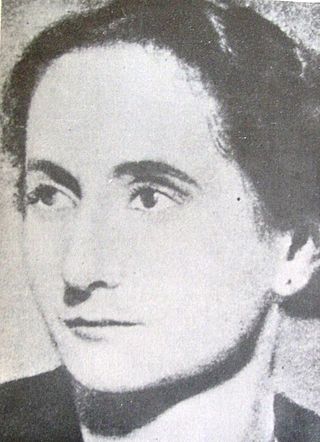Related Research Articles

Joaquim Maria Machado de Assis, often known by his surnames as Machado de Assis, Machado, or Bruxo do Cosme Velho, was a pioneer Brazilian novelist, poet, playwright and short story writer, widely regarded as the greatest writer of Brazilian literature. In 1897, he founded and became the first President of the Brazilian Academy of Letters. He was multilingual, having taught himself French, English, German and Greek later in life.
Papel volante is a Portuguese name that designates a form of popular literature that may include popular prints. They date from the seventeenth to twentieth centuries, and are usually in an eight-page quarto format. They were at their height in the eighteenth century. They are similar to the French literature of colportage, English chapbooks or to the Spanish pliegos, papeles volantes or hojas volanderas. They are also known as literatura de cordel, particularly in the northeast of Brazil.

A chapbook is a type of small printed booklet that was popular medium for street literature throughout early modern Europe. Chapbooks were usually produced cheaply, illustrated with crude woodcuts and printed on a single sheet folded into 8, 12, 16, or 24 pages, sometimes bound with a saddle stitch. Printers provided chapbooks on credit to chapmen, who sold them both from door to door and at markets and fairs, then paying for the stock they sold. The tradition of chapbooks emerged during the 16th century as printed books were becoming affordable, with the medium ultimately reaching its height of popularity during the 17th and 18th centuries. Various ephemera and popular or folk literature were published as chapbooks, such as almanacs, children's literature, folklore, ballads, nursery rhymes, pamphlets, poetry, and political and religious tracts. The term chapbook remains in use by publishers to refer to short, inexpensive booklets.

Érico Lopes Verissimo was an important Brazilian writer, born in the State of Rio Grande do Sul.

Brazilian literature is the literature written in the Portuguese language by Brazilians or in Brazil, including works written prior to the country's independence in 1822. Throughout its early years, literature from Brazil followed the literary trends of Portugal, gradually shifting to a different and authentic writing style in the course of the 19th and 20th centuries, in the search for truly Brazilian themes and use of Brazilian forms.

Cordel literature (from the Portuguese term, literatura de cordel, literally “string literature”, Portuguese pronunciation:[koʁˈdɛw]) are popular and inexpensively printed booklets or pamphlets containing folk novels, poems and songs. They are produced and sold in street markets and by street vendors in Brazil, mainly in the Northeast. They are so named because they are hung from strings to display them to potential customers, and the word for rope in Portuguese is corda, from which the term cordel is derived.

Lygia Fagundes da Silva Telles, also known as "the lady of Brazilian literature" and "the greatest Brazilian writer" while alive, was a Brazilian novelist and writer, considered by academics, critics and readers to be one of the most important and notable Brazilian writers in the 20th century and the history of Brazilian literature. In addition to being a lawyer, Lygia was widely represented in postmodernism, and her works portrayed classic and universal themes such as death, love, fear and madness, as well as fantasy.

Zélia Gattai Amado de Faria was a Brazilian photographer, memoirist, novelist and author of children's literature, as well as a member of the Brazilian Academy of Letters. Gattai wrote 14 different literary works, including children's books and her own personal memoirs have been widely published.
João Gilberto Noll was a Brazilian writer, born in Porto Alegre, in the southern Brazilian state of Rio Grande do Sul.

Adélia Luzia Prado Freitas is a Brazilian writer and poet.

Adriana Lisboa is a Brazilian writer. She is the author of seven novels, and has also published poetry, short stories, essays, and books for children. Originally written in Portuguese, her books have been translated into more than a dozen languages. Crow Blue is Lisboa's most recent novel translated into English and was named a book of the year by The Independent (London). Her stories and poems have appeared in Granta, Modern Poetry in Translation, The Brooklyn Rail, Litro, The Missing Slate, Joyland, Sonofabook, Waxwing, and others.

María Rosa Lida de Malkiel, born Maria Rosa Lida, was an Argentine philologist. Notable as an Hispanist medievalist, she came to the United States on a Rockefeller Foundation program of study. Beginning in 1947, Lida de Malkiel lectured for many years in the US, including at Harvard University, the University of California at Berkeley, and Stanford. An advisor to the editorial boards of two professional journals, in the 1950s she was admitted to the Real Academia Española and the Academia Argentina de Letras.

Milton Hatoum is a Brazilian writer, translator and professor. Hatoum is one of Brazil's most eminent contemporary writers. Among other honors, Hatoum was awarded Brazil's most prestigious literary award, the Jabuti Prize, three times for best novel. In 2017, he received the title of Officier de L'Ordre des Arts et des Lettres from the French government.
Maria Firmina dos Reis was a Brazilian author. She is considered Brazil's first black female novelist. In 1859, she published her first book Úrsula, which is considered the first Brazilian abolitionist novel. The book tells the story of a love triangle, in which the system of slavery is put into question.

Maria Bonita was the nickname of Maria Déia, a member of a Cangaço band, marauders and outlaws active in the Brazilian Northeast in the 1920s and 1930s. Maria Bonita means "Beautiful Maria". She has the status of a 'folk heroine' in Brazil. There is some inconsistency over her original name, with Maria Alia da Silva and Maria Gomes de Oliveira also attributed.
Ronald H. Chilcote is a political economist from the United States. He is currently the Edward A. Dickson Emeritus Professor of Economics and Political Science at the University of California, Riverside, and has served as managing editor of the academic journal Latin American Perspectives since its founding in 1974. Chilcote's main area of research is on Brazil, Portugal and the former Portuguese colonies in Africa, as well as comparative politics, political economy and development theory.
Gilvan Samico was a Brazilian painter, teacher and engraver of the Armorial Movement of graphic design.

Inocência Luciano dos Santos Mata is a Lisbon-based essayist and academic from São Tomé and Príncipe. Her work as a professor and researcher at the University of Lisbon's School of Letters is focused on Portuguese-language literature and post-colonial studies.

The Institute of Brazilian Studies, is a specialized research unit of the University of São Paulo, founded in 1962 on the initiative of Professor Sérgio Buarque de Holanda. It aims to research and document the history and culture of Brazil.

Jarid Arraes is a Brazilian poet and writer. She is the writer of such books as As Lendas de Dandara, Heroínas Negras Brasileiras em 15 cordéis, Um buraco com meu nome, and Redemoinho em dia quente. Arraes lives in São Paulo, where she created the Women's Writing Club. To date, she has more than 70 publications in the cordel literature style, including the biographical collection Heroínas Negras na História do Brasil.
References
- ↑ "Candace Slater" (in Portuguese). Museu da Pessoa. Archived from the original on 2018-03-20.
- ↑ "Candace Slater". University of California, Berkeley.
- 1 2 3 "Participant Biographies and Abstracts". Literatura de Cordel: Continuity and Change in Brazilian Popular Literature. American Folklore Center.